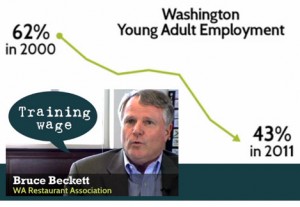STATE GOVERNMENT
Corporate interests push sub-minimum ‘training wage’
A non-partisan group’s survey on young adult employment implies Washington’s state minimum wage is to blame and offers sub-minimum training wage as one solution.
By DAVID GROVES
The Stand
(June 14, 2012) — Fewer than three in 10 American teenagers will hold jobs in the summer months of June through August, the Associated Press reports. But here in Washington state, this nationwide crisis may be used by corporate lobbying groups to try to roll back our state minimum wage laws.
Community Forums Network (CFN), a non-partisan “public engagement platform” launched last month, is currently spotlighting the issue of youth employment. The group, funded by Dick’s Drive-In restaurant owner Dick Spady’s foundation, is attempting to raise awareness and identify solutions to promoting entry-level jobs for young people. But the CFN is juxtaposing the issue alongside information about the state’s minimum wage, which rises every year to adjust for inflation thanks to a voter-approved initiative, implying a causal relationship.
“We are not an advocacy or lobbying organization and we will not be making policy recommendations,” CFN Executive Director Carrie Shaw told The Stand. “Over 1,500 individuals have weighed-in on the issue so far (via CFN’s online survey). Our main focus is to discover consensus, so findings from the survey will focus on where there is agreement. The raw data will be available online to anyone once the report is released.”
 The survey includes a question on whether creating a sub-minimum “training wage” could help address unemployment among young people. CFN’s survey questions are submitted by its organization partners, which include the Association of Washington Business, Washington Restaurant Association and the Washington Policy Center, all of which advocate for a lower minimum wage. Currently, no labor organizations are partners, but Shaw welcomes unions to join and urges union members to take the survey.
The survey includes a question on whether creating a sub-minimum “training wage” could help address unemployment among young people. CFN’s survey questions are submitted by its organization partners, which include the Association of Washington Business, Washington Restaurant Association and the Washington Policy Center, all of which advocate for a lower minimum wage. Currently, no labor organizations are partners, but Shaw welcomes unions to join and urges union members to take the survey.
CFN’s video on youth employment (below), which website visitors are urged to watch before taking the survey, prominently features Rep. Cary Condotta (R-East Wenatchee), who prime-sponsored three unsuccessful bills this year to lower the state minimum wage, including HB 1258 to legalize sub-minimum training wages for new employees, regardless of their age.
In the video, Condotta complains about business taxes being too high, “but more than that, the difference is the very high minimum wage,” he says.
The video also features Bruce Beckett, a lobbyist for the Washington Restaurant Association, specifically advocating for a sub-minimum training wage. He says youth employment in Washington has “plummeted (and) it’s much beyond the recessionary impacts.”
But as yesterday’s AP report explains, it is not a problem unique to Washington. The decline in young-adult employment has been particularly sharp across the nation since 2000, with employment for 16- to 19-year-olds falling to the lowest level since World War II. What reasons do AP sources cite for this crisis?
The drop in teen employment, steeper than for other age groups, is partly a cultural shift. More youths are spending summer months in school, at music or learning camps or in other activities geared for college. … (And) older workers, immigrants and debt-laden college graduates are taking away lower-skill work as they struggle to find their own jobs in the weak economy.
CFN reports that, compared to other states, Washington had the 9th lowest employment rate for young adults aged 16-24 last year at 42.7%. A chart or two below, CFN helpfully points out that Washington’s indexed minimum wage is the highest in the nation ($9.04/hour) and continues to rise.
The state that CFN lists as having the lowest youth employment rate (38.9%) is Georgia, which has a state minimum wage of $5.15 an hour, more than $2 below the current federal minimum wage of $7.25 an hour. Louisiana, a state with no minimum wage law, also ranks worse than Washington. In fact, just three of the 10 states listed as having the lowest youth employment rates — Washington, Florida and New Mexico — have minimum wages higher than $7.25. Given that 19 of 50 states exceed that federal minimum, 10 randomly selected states would be expected to have four in that category.
So why the focus on minimum wage?
“It’s more background in terms of this is what the minimum wage is — the highest in the country,” Shaw said. “It’s mainly background on the issue because the training wage is one of many possible solutions introduced in the survey and video.”
Although CFN will not advocate for any public policies, Shaw said, “We can’t control how the information is used.”





